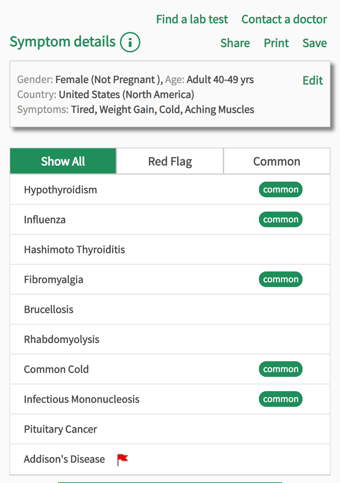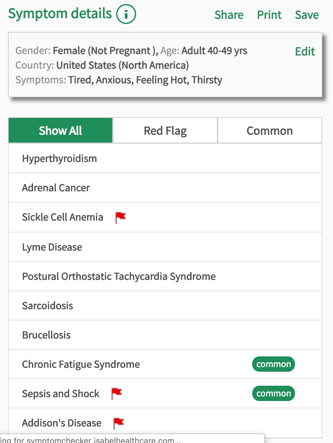- Privacy Policy
- Terms & Conditions
- Contact us
- ©Isabel Healthcare 2020
Hypothyroidism vs hyperthyroidism - what’s the difference?
 This week on the Isabel Healthcare blog we’re tackling the confusing and often daunting world of the thyroid. A lot of us will probably have heard of or come across thyroid conditions in the past, be that underactive, overactive, or even the rare thyroid cancer. But what’s the difference, what does it all mean, and most importantly, what are the symptoms we can be looking out for? We’ll also go over who’s at higher risk of developing thyroid problems and the treatments that are available.
This week on the Isabel Healthcare blog we’re tackling the confusing and often daunting world of the thyroid. A lot of us will probably have heard of or come across thyroid conditions in the past, be that underactive, overactive, or even the rare thyroid cancer. But what’s the difference, what does it all mean, and most importantly, what are the symptoms we can be looking out for? We’ll also go over who’s at higher risk of developing thyroid problems and the treatments that are available.
What is the thyroid?
The thyroid is a gland in the human body, meaning it is an organ that secretes substances to help the body function, in this case hormones. The thyroid gland produces two hormones by converting iodine in our foods. The hormones are called thyroxine (T4) and triiodothyronine (T3), and these hormones are needed in every cell in the body. They are involved in the metabolic process, the conversion of oxygen and calories into energy, allowing the cells in each part of the body to regulate how fast they work. Without the thyroid producing and secreting T3 and T4, none of our cells would be able to control how they work.
Thyroid problems
There are many diseases and conditions that affect the thyroid, which in turn can affect every part of the body, so it’s important to get any thyroid issues diagnosed and, if possible, sorted quickly. Temporary inflammation of the thyroid, and a rare form of thyroid cancer are possible, but the most common conditions are hypothyroidism and hyperthyroidism. Both of these occur when the thyroid gland does not secrete the correct amount of hormones into the body, causing cells all over to struggle. The two conditions share some symptoms and have others specific to each condition. Most symptoms for either condition, however, are very common in all sorts of diseases, so often misdiagnosed.
Who is at risk of thyroid problems?
Anyone can have issues with their thyroid at any point in their life, but they are more common in women. It’s not known exactly why this is, but we do know it is genetic and passed on through mothers and daughters. Cases also increase with age in both men and women. Having said that, young adults, children, and babies can all have issues with thyroid function. Babies are tested at around 5 days old. Teenagers going through puberty may have issues arise as they have an increased amount of all hormones in their body.
Hypothyroidism symptoms - underactive thyroid

This is the most common condition concerning the thyroid. Here, the thyroid does not produce and secrete enough hormones around the body, meaning cells slow down how fast they work. This manifests itself in many different ways, but the main symptoms to look out for are:
- fatigue
- unexplained weight gain
- aching muscles or weak muscles
- feeling cold and being sensitive to cold
- irregular or heavy periods
- depression
- constipation
Hyperthyroidism symptoms - overactive thyroid

Conversely, hyperthyroidism, which is not as common but certainly not rare, occurs when the cells receive too much of the thyroid hormones to work effectively. This can cause certain parts of the body to go into overdrive, for instance the heart may suffer palpitations. The main symptoms to be aware of are:
- fatigue
- mood swings
- anxiety and agitation
- insomnia
- persistent thirst
- feeling hot and being sensitive to heat
Treating hypothyroidism and hyperthyroidism
Once diagnosed using various blood tests and possibly a scan, under or over active thyroids can be treated and usually people can regain a normal function of the thyroid and all the cells in the body. Hypothyroidism is usually treated by replacing the hormones that aren’t being produced enough with a synthetic replacement, known as Levothyroxine. This will usually need to be taken for the rest of your life, as the thyroid will no longer produce enough on its own. Hyperthyroidism, however, has a few treatment options. Medication called thionamides are often used to stop the thyroid producing so many hormones, but this can take a while to come into effect, and getting the right dose can take some time. They also have some common side effects such as nausea, headaches and in some cases a rash. Another option involves radiation to damage the thyroid just enough to stop producing too many hormones. This treatment is very effective and can actually cure the hyperthyroidism. Finally, some people have their thyroid removed entirely, meaning they then have to take the Levothyroxine to replace the complete lack of thyroid hormones. Many people, particularly when trying to sort out treatment, will switch between having hypo- and hyper- thyroidism as the thyroid tries to balance itself out. It is a delicate balance and conversation with your doctor will help you to reach a treatment plan that’s right for you.
If you are worried about your symptoms and want to talk to your doctor about them, you can always place symptoms into the Isabel Symptom Checker and take the results into the doctor with you, to help you with the discussions.
Subscribe Here!
Recent Posts
Virtual Triage: Do more questions lead to better patient outcomes?
One of the common misconceptions related to virtual triage / symptom checker tools is that the more..Webinar: Using Virtual Triage To Transform Patient Access
Outdated contact centers are posing problems for today's health systems. As longer hold times..List Of Categories
- Differential Diagnosis Decision Support
- Differential diagnosis
- Symptom Checker
- Symptoms
- Medical Error
- Patient Disease Information
- Disease
- Diagnostic Decision Support
- Clinical Decision Support
- Isabel 1 Minute Read
- Diagnosis Error
- Diagnosis Skills Cases
- Healthcare Informatics
- Medical Education
- Patient Engagement
- Clinical Reasoning
- Evidence-based Medicine
- Symptom Triage
- Nurse Practitioner Education
- Nursing Decision Support
- Partnership
- Public Health
- COVID-19
- EHR
- Patient Empowerment
- Patient Safety
- rare disease

Start your FREE Trial today
Try the Isabel Pro DDx generator for 30-days - no payment card details required.




